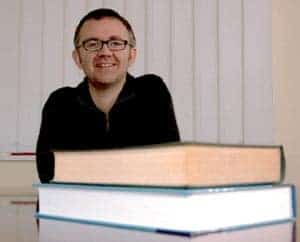Peter Rodgers has been editor of Physics World for 10 years. This is the last issue of the magazine that he will edit

What are the three best popular-science books?
By far the best popular book on science I have read is Strange Beauty: Murray Gell-Mann and the Revolution in Twentieth-Century Physics by George Johnson. Gell-Mann is an excellent subject for a biography – brilliant but flawed – and Johnson proves his equal as a biographer. Whether describing the precocious young Gell-Mann’s school days, his outstanding achievements as a theoretical physicist, or his problems in writing his own book (the underwhelming The Quark and the Jaguar), Johnson has produced a masterpiece of writing and reporting.
In the days before Amazon I spent years trying to track down a copy of Nobel Dreams: Power, Deceit and the Ultimate Experiment by Gary Taubes. Eventually I found a copy and it was well worth the wait. Based on a prolonged visit by Taubes to CERN, it is a warts-and-all description of the race between the UA1 and UA2 collaborations to discover W and Z bosons at the lab, and the subsequent – and not so successful – experimental run to search for supersymmetric particles. To say that Carlo Rubbia, who led the victorious UA1 team, emerges as larger than life is an enormous understatement (see “Carlo Rubbia and the discovery of the W and Z” Physics World January 2003 pp 23-28 for an extract from the book).
The Elegant Universe by Brian Greene might seem like an obvious choice – an international bestseller that won the Aventis Prize for Science Books in 2000 – but it is also an excellent book. After a clear introduction to the usual basics (quantum mechanics, relativity and so on), Greene moves on to more complicated matters (supersymmetry, inflation, strings and so forth), before getting stuck into the very latest (at the time) work on M-theory, branes and the like. While much of this latter material will date quite quickly, it provides an excellent insight into what it is like trying to do research at one of the frontiers of our subject.
What science books are you reading at the moment?
I have just started Soft Machines: Nanotechnology and Life by Richard Jones to help me to adjust to life after Physics World. Those wanting a quick summary can read “The future of nanotechnology” by Jones, who is a physicist at Sheffield University, in the August 2004 issue of the magazine (see “The future of nanotechnology “ Physics World August 2004 p25-29).
What else are you reading at present?
I am currently reading Van Morrison: No Surrender by Johnny Rogan, a biography of the famously irascible singer from Northern Ireland. So far there has been a lot about the R&B scene in Belfast in the first half of the 1960s – which sounds very different to the Belfast that I lived in as a PhD student in the late 1980s – and Morrison’s early days with the band Them. I am only about one-third of the way through the book but it is unlikely to contain a better description of Morrison than the following sentence from chapter eight: “With his unattractive personality, plain looks, wavy red hair, pot belly and diminutive stature, Morrison was a publicist’s nightmare.”
Which popular-science book have you never read, but feel you ought to have tackled, and why?
I cannot decide if I should read A Brief History of Nearly Everything by Bill Bryson. I have not read any of his previous books – I find the whole idea of comic travel writing to be depressing – but it has had tremendous reviews (at least according to the blurbs on the dust jacket) and has won the Aventis prize as well. It might also be informative to see what an outside observer makes of the whole scientific enterprise.



